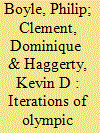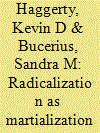|
|
|
Sort Order |
|
|
|
Items / Page
|
|
|
|
|
|
|
| Srl | Item |
| 1 |
ID:
089094


|
|
|
|
|
| Summary/Abstract |
In the aftermath of the 9/11 terrorist attacks hawala, an ancient form of money transfer, has come to prominent international attention due to its ostensible role in funding global terrorism. The United States and its international allies have initiated a host of measures to try and render hawala practices more visible and hence governable. This paper details some of these measures, paying particular attention to how they connect with larger dynamics of surveillance, documentation and trust. We suggest that because officials have ignored distinctive attributes of hawala that pertain to these three dynamics, their regulatory efforts will likely have little impact on the operation of hawala. Our concluding discussion posits a number of alternative factors that might explain why officials have embraced these particular measures to try and regulate hawala.
|
|
|
|
|
|
|
|
|
|
|
|
|
|
|
|
| 2 |
ID:
138068


|
|
|
|
|
| Summary/Abstract |
This article compares security dynamics at two Olympic Games hosted by Canada: Montreal (1976) and Vancouver (2010). It is the first study of security at the Montreal Olympics and was only made possible after four years of requests under the Access to Information Act that resulted in the release of thousands of classified security documents in French and English. A comparative study of the two largest peacetime security operations in Canadian history offers unique insights into the challenges of hosting a major international gathering in the aftermath of an international terrorist incident: the 1972 Munich massacre and the 11 September 2001 attack on the World Trade Center. The comparison further offers an opportunity to chart the continuities and differences in Olympic security over time. We focus in part on how the historical context of each event informed ‘imaginaries of disaster’. We also examine continuities in the official security response, such as the emphasis on advance intelligence gathering, security ‘mock-ups’, manpower allocation, coalitions of security agencies and technological innovation. We conclude with some considerations on security legacies and the importance of major event security as a subject of comparative inquiry.
|
|
|
|
|
|
|
|
|
|
|
|
|
|
|
|
| 3 |
ID:
172199


|
|
|
|
|
| Summary/Abstract |
The process whereby individual terrorists radicalize into violent extremism is typically understood as involving a series of individual mechanisms (e.g., grievance, attachment to friends, thrill), group processes (e.g., competition, social cohesion), and mass-public mechanisms. In this article, we demonstrate that this process is actually better understood as one of “martialization,” applicable to varying degrees to conventional and unconventional soldiers alike. We detail these commonalties via an analysis of six key themes in the literature: a) a sense of vicarious injustice, b) a sense of belonging/identity, c) meaning, excitement, and glory, d) active recruitment, e) indoctrination, and f) group solidarity. Lastly, we suggest why scholars have previously been blind to these parallels. By not recognizing the similarities, we are missing out on the opportunity to mobilize our entire existing knowledge base (on conventional and unconventional soldiers) for creating useful policies for countering violent extremism.
|
|
|
|
|
|
|
|
|
|
|
|
|
|
|
|
| 4 |
ID:
090726


|
|
|
|
|
| Publication |
2009.
|
| Summary/Abstract |
In Discipline and Punish Foucault famously declares that "our society is one not of spectacle, but of surveillance." Our theoretical aim in this paper is to problematize Foucault's strict demarcation between spectacle and surveillance through an analysis of urban mega-events. In the process, we detail emerging features of contemporary mega-events that shape and are shaped by shifts in the field of security and surveillance more broadly. Three dynamics in particular warrant consideration: the move toward a precautionary logic among security planners, a "semiotic shift" wherein security iconography is integrally bound up with the production of contemporary urban spectacles, and various forms of security and surveillance legacies that circulate beyond the spatial and temporal frame of the event itself. While mega-events support Foucault's assertion of the dispersal of discipline across the social field, they also suggest that this dispersal occurs in concert with, not in spite of, the power of the spectacle in contemporary society.
|
|
|
|
|
|
|
|
|
|
|
|
|
|
|
|
|
|
|
|
|